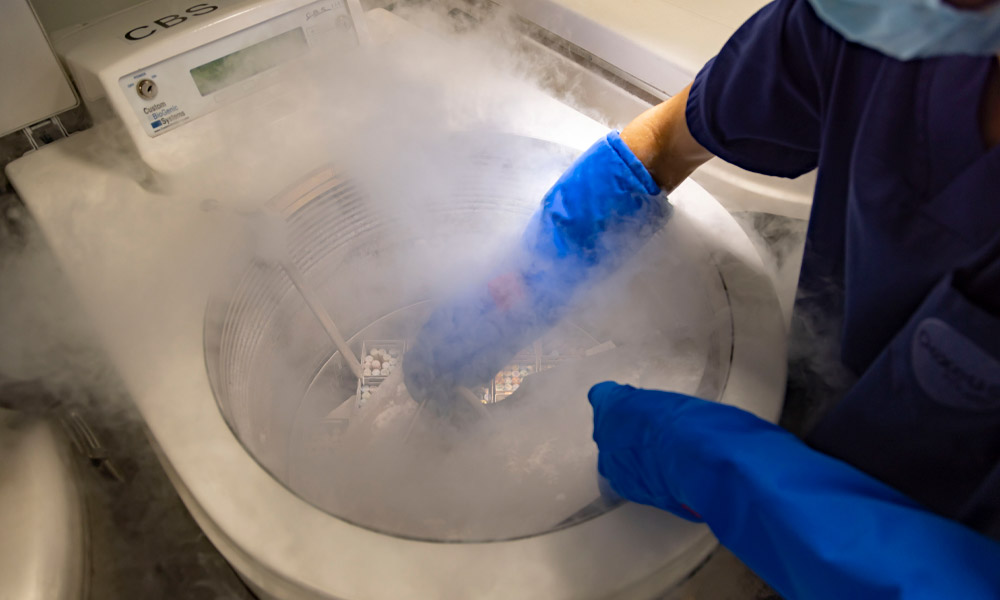
A group of researchers from the Reproductive Medicine Unit of our centre have conducted a large study to assess whether the presence of high levels of progesterone in patients on hormone replacement therapy could have a negative impact on reproductive outcomes in frozen embryo transfers (FET).
The study included a total of 3,183 frozen embryo transfer (FET) cycles in patients on hormone replacement therapy between March 2009 and December 2020. A total of 1,360 cycles were frozen homologous embryo transfers (hom-FET), 1,024 were frozen euploid embryo transfers (eu-FET) after preimplantation genetic testing for aneuploidy, and 799 cycles were frozen heterologous embryo transfers (het-FET). All patients had adequate serum progesterone levels prior to the procedure.
According to the results, no differences in live birth rates were found between patients with high progesterone levels ( >p90 and >p95) versus the rest of the patients. Furthermore, the results were similar for the different types of FET analysed (hom-FET, eu-FET and het-FET).
The authors concluded that elevated serum progesterone levels before a frozen embryo transfer do not negatively impact reproductive outcomes as long as the patient has an adequate minimum level of progesterone the day before or on the day of the transfer (10.6 ng/mL).
Reference article:
Elevated serum progesterone levels before frozen embryo transfer do not negatively impact reproductive outcomes: a large retrospective cohort study
Iñaki González-Foruria, Sandra García, Manuel Álvarez, Annalisa Racca, María Hernández, Nikolaos P Polyzos, Buenaventura Coroleu
Fertil Steril. 2023 May 2; S0015-0282(23)00330-8. doi: 10.1016/j.fertnstert.2023.04.038
DEXEUS CAMPUS
Gran Vía de Carles III 71-75
08028 Barcelona
campus@dexeus.com
(+34) 93 227 47 09
® Copyright 2021-2025 Dexeus Mujer Foundation – Gran Via Carles III 71-75. 08028 Barcelona. Spain
| Cookie | Duration | Description |
|---|---|---|
| cookielawinfo-checkbox-analytics | This cookie is set by the GDPR cookie consent plugin. The cookie is used to store the user's consent for cookies in the "Analytics" category. | |
| cookielawinfo-checkbox-functional | The cookie is set by the GDPR cookie consent to record user consent for cookies in the "Functional" category. | |
| cookielawinfo-checkbox-necessary | This cookie is set by the GDPR cookie consent plugin. Cookies are used to store the user's consent for cookies in the "Necessary" category. | |
| cookielawinfo-checkbox-others | This cookie is used by the GDPR component. It is used to store the user consenting cookies in the "Other" category. | |
| cookielawinfo-checkbox-performance | This cookie is set by the GDPR cookie consent plugin. The cookie is used to store the user's consent for cookies in the "Performance" category. | |
| elementor | ||
| viewed_cookie_policy | The cookie is set by the GDPR cookie consent plugin and is used to store whether or not the user has consented to the use of cookies. It does not store any personal data. |
| Cookie | Duration | Description |
|---|---|---|
| _icl_visitor_lang_js | To allow multi-language functionality for web content. | |
| wpml_browser_redirect_test | Used to verify if cookies are allowed in the browser. |
| Cookie | Duration | Description |
|---|---|---|
| _ga | The _ga cookie, installed by Google Analytics, calculates visitor, session and campaign data and also tracks site usage for the site's analytics report. The cookie stores information anonymously and assigns a randomly generated number to recognize unique visitors. The _ga cookie, installed by Google Analytics, calculates visitor, session and campaign data and also tracks site usage for the site's analytics report. The cookie stores information anonymously and assigns a randomly generated number to recognize unique visitors. | |
| _ga_1WD9MFDMJK | This cookie is installed by Google Analytics. |
| Cookie | Duration | Description |
|---|---|---|
| wp-wpml_current_language | Necessary for the operation of the website in the different languages |